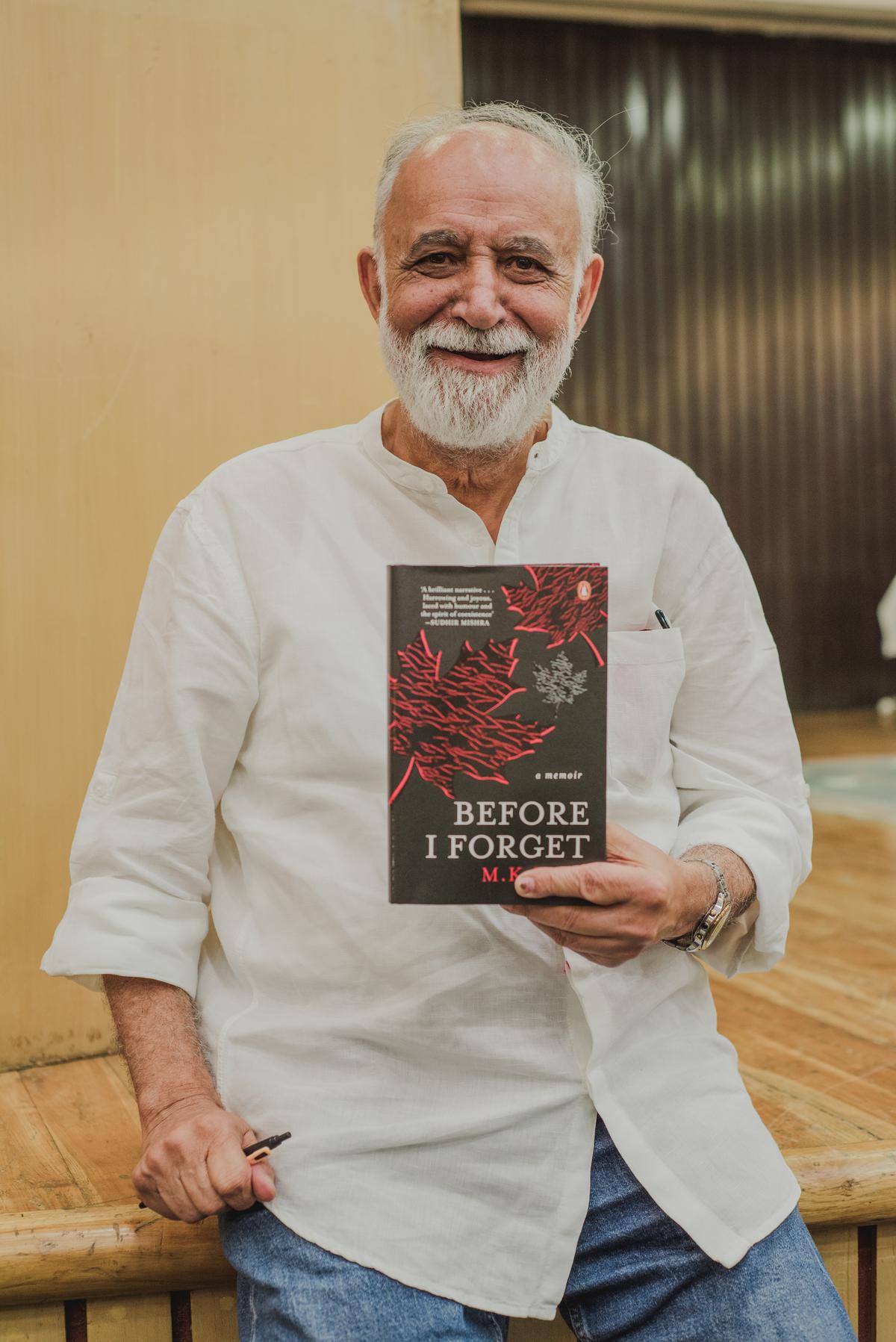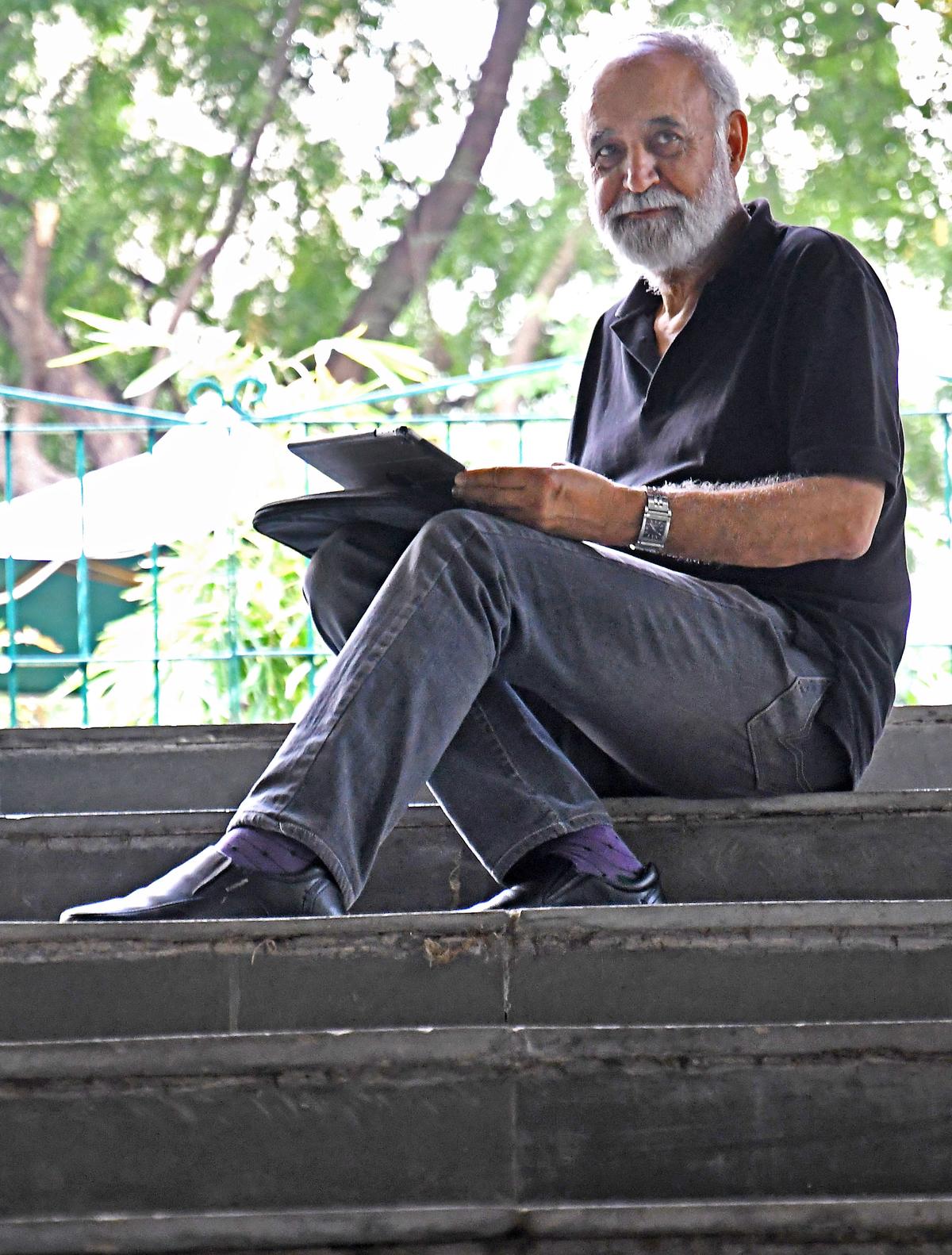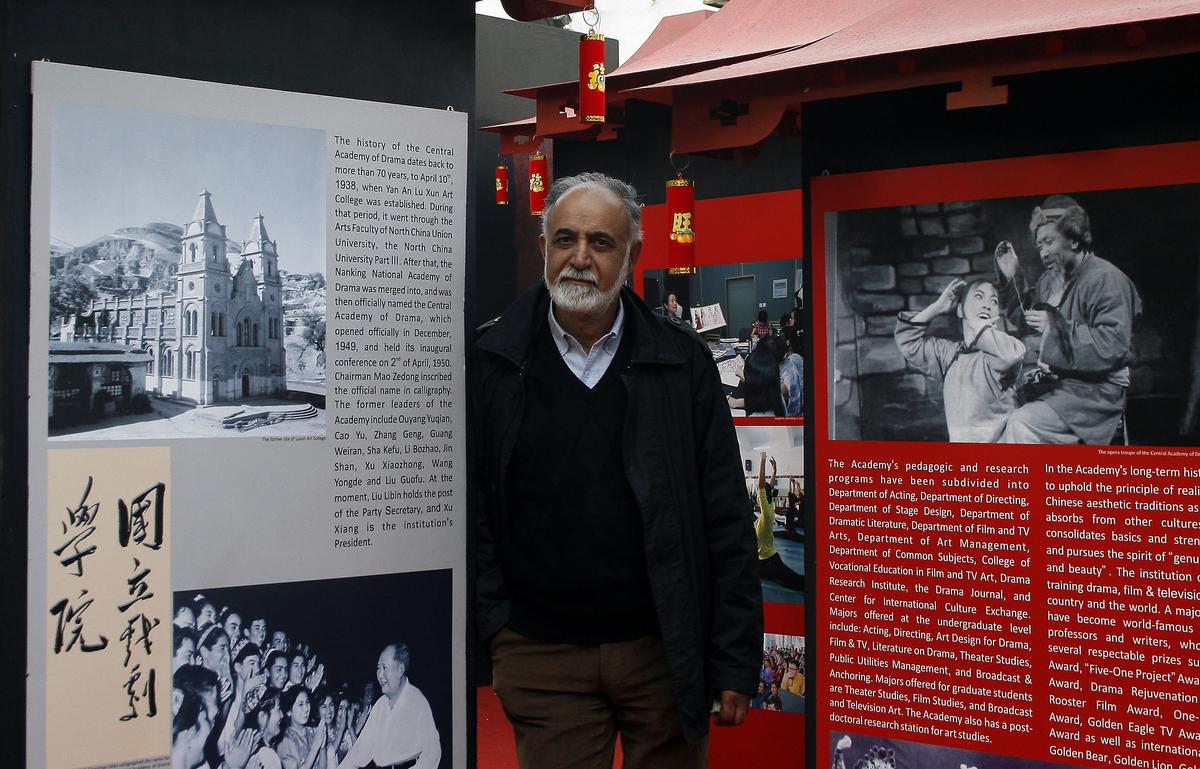M.Okay. Raina at his home in Noida. On the wall behind him hangs {a photograph} of his adaptation of King Lear in Bandh Pather type of Kashmiri people theatre.
| Picture Credit score: Anuj Kumar
Sad is the land that wants a hero.” Maharaj Krishna Raina prefers to observe what German playwright Bertolt Brecht famously stated in a rustic that likes to bask in hero worship. Over time, the veteran theatre practitioner has coated his conviction with a delicate smile and used tradition as a catalyst for socio-political change in essentially the most delicate elements of the nation. Be it Punjab, Kashmir or the North East, Raina says his mantra has at all times been, “hero nahin banana hai”, making his artwork do the speaking.

M Okay Raina together with his memoir Earlier than I Overlook
| Picture Credit score:
Particular Association
In the course of the pandemic, Raina bought time to pause and look again at an enterprising profession and the result’s an immensely readable account. Aptly titled Earlier than I Overlook (Penguin Classics), the memoir traces the historic occasions that formed Raina and knowledgeable his artwork. The theft of the holy relic from the Hazratbal shrine in his hometown of Srinagar in 1963, the 1984 anti-Sikh riots in Delhi, the brutal homicide of cultural activist and shut good friend Safdar Hashmi in 1989, the exodus of Kashmiri Pandits, the fallout of Babri Masjid demolition in 1992 and the ethnic rigidity within the North East, the memoir reads like a layered script the place it’s not possible to take sides. No surprise his good friend and director Sudhir Mishra is considering a movie script out of Raina’s wealthy reminiscence.
Right here is an actor-auteur-activist who stood his floor in turbulent circumstances, at occasions life-threatening. Like his performs, Raina avoids cliches in actual life and finds humour and hope at nighttime. Taking a line from his well-known play on the Oppenheimer trial a lot earlier than Christopher Nolan woke as much as the relevance of the physicist, Raina says he doesn’t prefer to observe the concepts of others.
In Safdar’s case, he questioned the fascist forces of disruption and alongside together with his associates, which included actor Shabana Azmi, turned the opening ceremony of the Worldwide Movie Pageant Of India in Delhi right into a flop present. A couple of years later, after the demolition of Babri mosque, Raina was once more on the forefront, coining the slogan: Ab koi nara na hoga, bas desh bachana hoga (Now there will probably be no sloganeering, it would solely be about saving the nation) and questioned Atal Bihari Vajpayee. When Kashmiri Pandits had been pushed out of their houses, he held the silence of the secularists answerable for pushing the Pandits and the political narrative into the arms of the right-wing ecosystem.

Raina actually took theatre to the grassroots.
| Picture Credit score:
SANDEEP SAXENA
“We will’t stop to be a citizen,” says Raina. He attracts inspiration from the Buddha’s idol the place he’s in deep meditation however his one hand is touching the bottom. “I analyse it for myself as — for those who stay in contact with the bottom, you received’t go unsuitable.” Usually, he says, the remedy of stinging nettle is one other weed that grows close by. “You simply should search for it.” Inquiry, he says, is vital in Indian custom. “Chela guru se sawal karta hai (The disciple seeks solutions from the Guru). It’s there in our Purarans. It’s the crux of the Bhagvad Gita. Sadly, this custom is diminishing.”
Raina describes himself because the “product of the socialist India” that allowed him loads of reasonably priced books and a chance to hone his craft on the Nationwide College of Drama. “Majority of us had been from modest backgrounds with a wealthy repertoire of custom and no inferiority complicated.” He was maybe the primary who actually adopted the aim of the theatre faculty: taking the artwork type to the grassroots.
From Raina’s play ‘Badshah Pather’ staged at Kalakshetra Basis, Chennai, in 2013.
| Picture Credit score:
KARUNAKARAN M
Battling stereotypes, Raina labored laborious to revive people theatre in Kashmir valley on the flip of the millennium. “I revived my hyperlinks with the normal artist villages that dot the world between Anantnag and Pahalgam and labored quietly. He offered them with alternatives to contribute to theatre. “We requested native potters to make masks and implored tailors to tweak their craft to create costumes. A trunk maker improvised to design synthetic swords.” When the viewers measurement reached 5000, the separatists woke as much as Raina and his workforce’s presence in Pir Panjal. “They tried to thwart our efforts however by then villagers had realised tradition’s position in venting pent-up emotions. They might inform these with the weapons: ab tum humein hasne bhi nahin doge. (you received’t even enable us to giggle).”
Raina fondly remembers his appearing stint that began with Avatar Kaul’s avant-garde 27 Down with Rakhee the place he performed a ticket collector. Shot on an actual practice, Raina remembers that the authorities gave in to the persistence of the younger workforce. “So long as you can disguise the cameras, it was not too costly to shoot on platforms and trains. In reality, at occasions, passengers took me as an actual TC. Taking pictures on railway stations and trains turned costly solely after B.R. Chopra made The Burning Prepare.”

Raina at Nationwide College of Drama in New Delhi on January 14, 2012.
| Picture Credit score:
SHIV KUMAR PUSHPAKAR
Raina went on to work with stalwarts of artwork home cinema like Mani Kaul and Mrinal Sen. “We had been a part of a motion that believed in wholesome theatre and needed to hold ahead the identical sensibilities in cinema however the motion fizzled out when the filmmakers began to rope in stars beneath field workplace stress,” says Raina.





